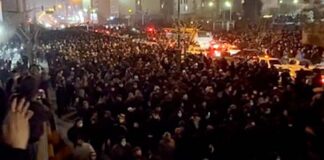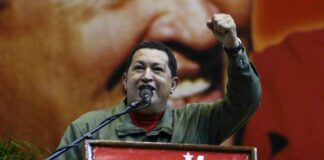Barack Obama has doubled the US troop commitment to the latest war on Iraq, and used the APEC conference to ask allies including Australia to send additional contributions too.
But Western intervention will solve nothing. The war is already increasing sectarian conflict and drawing the US and its allies deeper and deeper into a quagmire.
Two hundred elite soldiers from the Australian SAS have already deployed, following an extended stay in the United Arab Emirates, waiting for a green light from the Iraqi government. Despite officially there in a “training role” for the Iraqi army, it is clear the soldiers will see combat. The troops come on top of a substantial Australian commitment to the air war, with RAAF fighter planes flying more than 150 bombing missions since September.
Australian troops delayed deployment until receiving immunity from prosecution under Iraqi law for any killings they commit. Political instability in Baghdad stalled negotiations. In August, the US abandoned support for Iraqi PM Nouri al-Maliki, who had led the essentially sectarian Shia regime installed under the US occupation since 2006. The resulting political shake-up delivered an Iraqi cabinet allegedly more “inclusive” of Sunnis, who even the US recognised had been fundamentally alienated.
The cabinet changes have not altered the sectarian dynamics. The newly appointed Interior Minister is Mohammed Salem Ghabban, a senior member of the Badr Corps, a Shia militia implicated in the torture and killing of Sunnis.
Both Amnesty International and Human Rights Watch (HRW) have recently released reports detailing massacres by Shia militia linked with the government in Baghdad. Joe Stork from HRW said, “Pro-government militias are becoming emboldened and their crimes more shocking…and they wonder why Islamic State has had such appeal among Sunni communities”.
One such massacre took place at a Sunni mosque in the village Imam Weiss, 100 kilometres northeast of Baghdad, in full view of the Iraqi army. A spokesperson for the Interior Ministry told the LA Times the killings were “a normal, spontaneous reaction of revenge” for the devastating car-bombing of Shia areas by IS.
It is clear that Shia militias have become deeply involved in the war, with the Iraqi army remaining mired in corruption and dysfunction
Iraq correspondent Patrick Cockburn says that Shia militias are responsible for far more of the fighting than the army. Cockburn says they are often the first to move into areas softened up by US bombing raids and work to “cleanse areas of mixed Sunni population” around Baghdad.
IS has continued to make territorial gains in Iraq since the bombing campaign began, but the Iraqi army has also managed to claw back ground, driving IS from the Baiji oil refinery in northern Iraq in November.
Escalation
Despite Obama’s stated intention to “destroy and degrade” IS through this war, senior US military figures have questioned whether this is possible through bombing alone. A memo to Obama from Defense Secretary Chuck Hagel, some of which was leaked to the press, complained there was “no end game” to the bombing policy. There is open discussion amongst the US military about the necessity of deploying ground troops, despite Obama’s promises to the contrary. General Martin Dempsey, chairman of the Joint Chiefs of Staff, confirmed to the House Armed Services Committee in early November that such a deployment might be necessary next year, when the Iraqi security forces plan an attempt to take back IS strongholds in the Anbar province and Mosul.
In Syria, it is the murderous regime of Bashar al-Assad that has been the main beneficiary of the US bombing campaign. While Abbott and Obama consistently cite the very real horror of IS atrocities, Assad’s own bombing caused 600 casualties in just the first two weeks of November, overwhelmingly civilians, according to the Syrian Observatory of Human Rights.
Now that IS is running municipal and often industrial infrastructure in the areas it occupies in Syria and Iraq, US bombing raids “targeting IS” can lead to the deaths of workers trying to feed their families. On 9 November, ten oil workers were killed in Raqqa at an oil facility now controlled by IS. Australian RAAF planes have similarly been involved in attacks on IS controlled oil refineries in Iraq.
Iraq and Syria are in the midst of an unimaginable humanitarian catastrophe. This is a consequence of both the legacy of the US occupation of Iraq, the brutal counter-revolution waged by Assad in Syria and the military meddling of imperialist and sub-imperialist powers.
The UNHCR estimates 13.6 million people have been displaced and hundreds of thousands killed. Many are without food or shelter as winter begins to take hold. Western leaders are closing their borders to these refugees and drip-feeding aid at the same time as their bombs rain down further misery and greater numbers of troops prepare to enter the killing fields.
By Paddy Gibson





